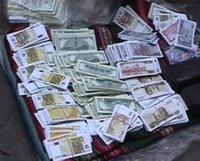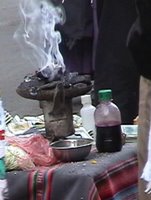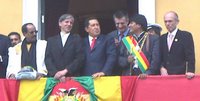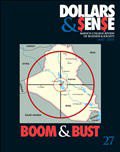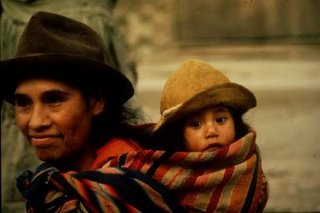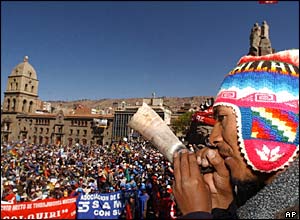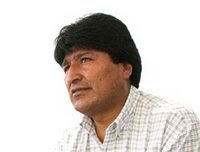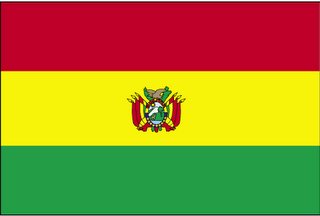Bechtel vs. Bolivia:Economic Opportunism Exposed
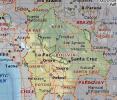
The Cochabamba Water Revolt
In January 2000 the people of Cochabamba, Bolivia woke up one morning to discover that their public water
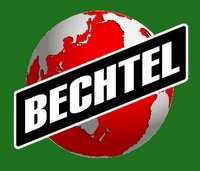 system had been taken over by a mysterious new private company, Aguas del Tunari. The World Bank had coerced Bolivia into privatizing its water, as a condition of further aid. The new company, controlled by Bechtel, the California engineering giant, announced its arrival with a huge instant increase in local water bills. Water rates increased by an average of more than fifty percent, and in some cases even higher. Bechtel and its Spanish opportunist co-investor, Abengoa, had priced water beyond what many families here could afford.
system had been taken over by a mysterious new private company, Aguas del Tunari. The World Bank had coerced Bolivia into privatizing its water, as a condition of further aid. The new company, controlled by Bechtel, the California engineering giant, announced its arrival with a huge instant increase in local water bills. Water rates increased by an average of more than fifty percent, and in some cases even higher. Bechtel and its Spanish opportunist co-investor, Abengoa, had priced water beyond what many families here could afford.Citizens of Cochabamba demanded that the imposition of rate hikes be permanently reversed. The ruling Bolivian government had belligerently denied these requests. Then those of Cochabamba demanded that the contract with the company be quashed or voided. Instead, the US-backed government deployed national police forces and soldiers to seize control of the city and enforce a state of martial law upon its own citizens.
The people of Cochabamba were then faced with severe police brutality and beatings at the hands of authorities. The leaders of the civil disobedience were then forcibly removed from their homes and illegally detained in the dead of night. Sadly, the city lost a seventeen-year-old boy after he was shot & killed by government forces. Even in the face of such brutality, those same citizens refused to relent or desist. Finally in April of 2000, Bechtel was forced to abandon its water contracts & leave its facilities in Cochabamba - the people of Cochabamba had won back their right to public water.
Bechtel Fights Back
Eighteen months later Bechtel and Abengoa sought to economically bankrupt Bolivia by filing a $50 million legal action against the country in the World Bank's trade court, the International Center for Settlement of Investment Disputes (ICSID). An “extra-judicial” forum that was tailor-made for global multi-national companies like Bechtel. The people of Cochabamba were required to make arguments & attend court proceedings in Washington DC. The proceedings were then to be conducted in English & contained within a process so secretive that no member of the public or press would be allowed to bear witness. There was to be no notification of those who would testify before such a court, nor would there be access to the records of what was actually to be testified in the record.
Bechtel maintained that it was suing for both its losses and the future profits that the company was not going to accrue. Public records had later verified & established that Bechtel and its opportunistic associates had yet to spend $1 million USD in Bolivia. The estimated annual GDP for Bolivia in 2005 is $25,892,000.00 USD, making Bechtel's intentions questionable and the ICSID court's mere establishment an embarrassment.
The People vs. Bechtel
Organizations from 43 countries joined in a citizens' petition to the World Bank demanding that the case be made available to public scrutiny & participation. Activists in Washington DC began to stage protests at the home of the head of Bechtel's water company. Hundreds of articles and dozens of documentaries were published and produced worldwide, making Bechtel and its Bolivian water takeover a poster child of corporate economic colonialism and opportunism.
Bechtel is so powerful a corporation that it is awarded billion-dollar, no-bid contracts to rebuild Iraq by the Bush Administration. This multi-national company had to discover the hard way that the people of Cochabamba were a greater force than such a conglomerate could maneuver past. In June of 2005, Bechtel and its associates capitulated to public pressure and initiated a negotiating process to withdraw their case for the token payment of two bolivianos (thirty cents).
Sources closest to the negotiations say that Bechtel's CEO, Riley Bechtel, personally intervened to bring the case to an end. Seemingly, the company was weary of the ongoing damage to the corporation's public perception. Bechtel even flew officials to Bolivia this month to sign the closing document, collect their two coins and perform the proverbial media perp walk.
Bechtel's Settlement & Its Implications
Bechtel's settlement is historic in the context that it stems from the economic raiding of a developing country's natural resources by advocates of free market globalization. The World Bank's system of closed-door trade courts has received more than 200 cases similar to that of Bechtel's. Both the World Trade Organization and the North American Free Trade Agreement administer "trade courts" which have a myriad of cases where multi-nationals are permitted to move against impoverished nations.
Yet to this date, in no other publicly noted case has such a powerful multi-national withdrawn from pending litigation as a result of public pressure.
International financial institutions, such as the World Bank and International Monetary Fund, coerce poor countries into privatization arrangements as a condition of most developmental aid. Corrupt & incompetent government officials negotiate with multi-national corporations behind closed doors, often producing transactions that are detrimental to the developing countries. It is only after the natural resources are sold to multi-nationals - which sell the basics of life for a profit - that the affected populations are made aware of these policies.
In Cochabamba, the people decided to take no more of "economic opportunism" by acting in the spirit of Caesar Chavez, Martin Luther King Jr., & Dr. Ernesto "Che" Guevara de la Serna and they secured their water. The local and global campaigns against Bechtel had sent an important message to other multi-nationals who are intent on their "legal" free-market raiding of even the poorest counties, like Bolivia and beyond.
Most global corporations can manage media relations with great ease. When Bechtel and it's associates assumed the risk concerning litigation in Cochabamba, they could only conclude that the cost to the company's public reputation outweighed the bankrupting payment they were to require of Bolivia.
Once again, it was made clear that the economic rules of the game can be modified even in the face of a tsunami-like tide of the free market. The people of Cochabamba won their struggle over water with personal courage & a steadfast commitment to the future generations. This series of events now emboldens the people of Bolivia as they have won the second and most important final round of the "water revolt".
Labels: Evo Morales Bolivia CNASD
 After inaugurating a new President and welcoming a new Cabinet, the citizens of La Paz celebrated the traditional fair of Alasita which begins every January 24th at Noon. The symbolism of new beginnings came full circle as residents purchased miniature replicas of cars, homes, official documents and money, hoping for prosperity in the coming year.
After inaugurating a new President and welcoming a new Cabinet, the citizens of La Paz celebrated the traditional fair of Alasita which begins every January 24th at Noon. The symbolism of new beginnings came full circle as residents purchased miniature replicas of cars, homes, official documents and money, hoping for prosperity in the coming year.